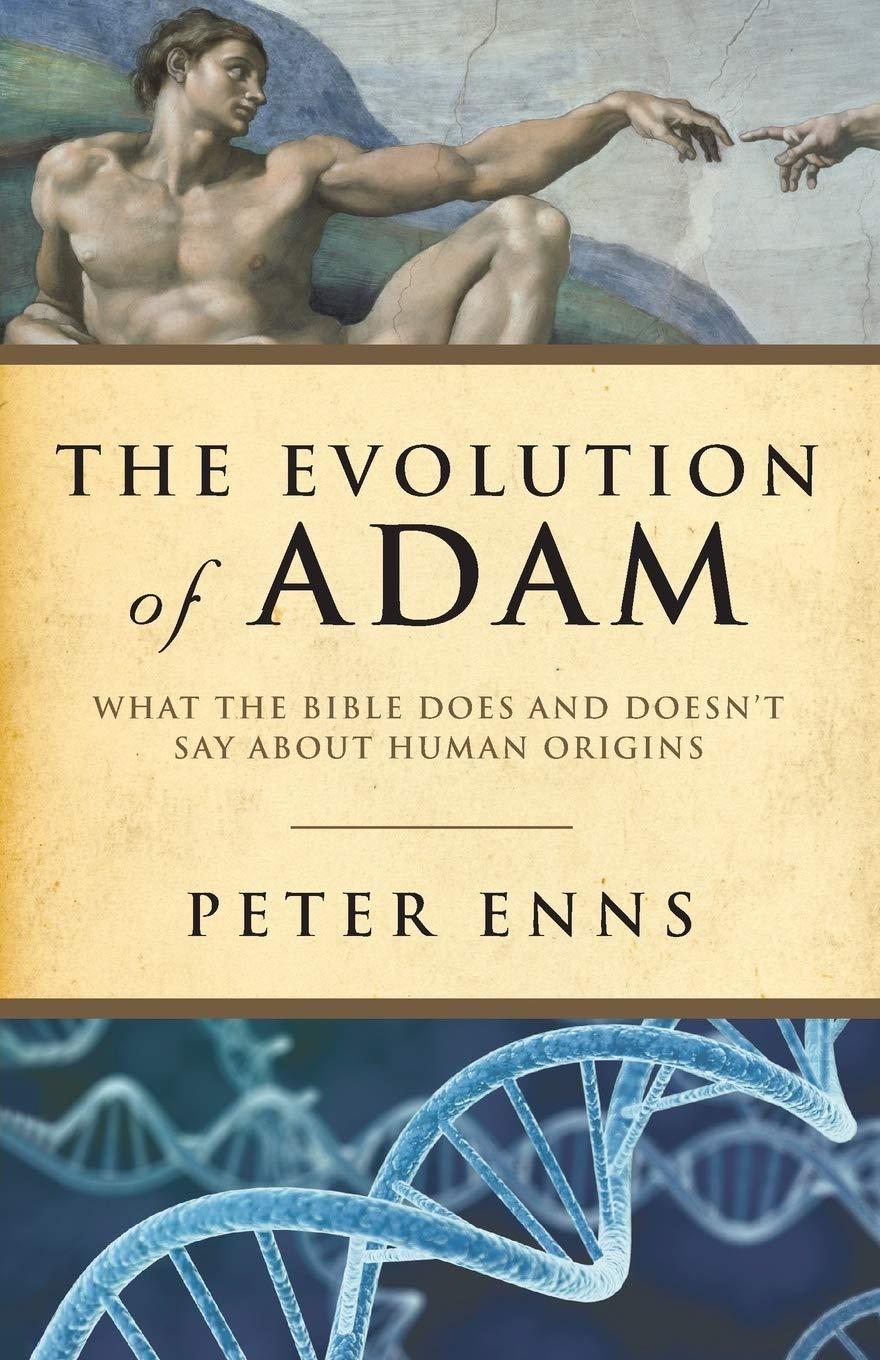
By cuterose
Adam, Christ, and Evolution
The theory of the evolution of species has rocked the world of traditional religious thought ever since it first gained prominence. To this day, even among those who accept theistic evolution, there is a tendency to strain over the concepts presented in Genesis, and try to make them graft with the new information we have given. In particular the struggle rages over the historicity of Adam and Eve as our “first parents”, when it seems more likely that, in the evolutionary model, humans developed gradually as a species and had a great many “parents” descending from the common ancestor we share with apes.
This does not even begin to discuss the research dealing withnew scientific finds that indicate neanderthals, a closely related species to humans, who evidently seem to have mated with humans (and thus quite a few humans share neanderthal DNA), may have been more “human” than we previously thought. Indeed, there are indications that these beings cared for each other communally, were capable of speech communication of some form, may have used crude tools, and more tellingly, were in touch with symbolic ideas necessary for creating art.
All this is still largely unproven, but there’s enough loose evidence to indicate that neanderthals were not necessarily sub-human at all, but may have lived alongside humans for generations, and functioned with us on an equal playing field. Why we became the dominant survivors is another whole field of inquiry (although, those of us with Neanderthal DNA might say we’re carrying the bygone banner, I guess?), but the question more pressing to theological discussion, especially in the Christian world, has been whether or not these creatures had souls.
I find myself rather concerned sometimes that the Church may be trying too hard to synchronize data with traditional doctrinal constructs which quite simply do not mesh, and the more it tries, the more it makes people outside the faith skeptical, because it seems we want to have our cake and eat it too. If we are dedicated to sorting out the truth of the matter, perhaps we need to take a step back and re-evaluate the traditional meanings we have ascribed to some of our doctrines, and consider if perhaps there is another way of coming at it more in line which what modern methods are able to tell us about our primordial past.
Indeed, I sometimes notice that Christian thinkers get a bit stuck on a particular, boxed-in version of “Original Sin” to a fault, not willing to look at possible alternate interpretations. For me, it is far easier, and perhaps more authentic to the nature of the original Jewish text, to see the story of Adam and Eve in highly symbolic and mythic terms, revealing universal truths based upon archetypes of the human condition, and spanning the entire history of rational beings. We are all created by God, and yet separate ourselves from the intimacy of the divine life through grasping after that which is forbidden to us, and that which ultimately corrupts us. We think we want to be our own gods, to decide good and evil for ourselves, and thereby lose our innocence of being aligned to the will of God.
So yes, Adam and Eve most certainly represent our species, and its innate “falleness”, on an archetypal level, just as the snake represents the subtle seduction of temptation and the forbidden fruit the sweet yet sickening taste of sin. The fact is all of us hear the whisperings of the World, the Flesh, and the Devil, and are weak in our ability to resist them. A traditional rendering of the doctrine of Original Sin would say that this weakened nature is as a result of the first sin. But if evolution is correct, perhaps it is simply a natural corollary of are developing out of our “animal” stage, and as such are still susceptible to self-centered cravings and instincts which were not sinful to us until the “Image of God” was placed in us, those spiritual functions that correlate with the physical development of our organs, especially the brain.
To put it succinctly, the Church, particularly based upon the works of St. Augustine, has often appealed to the fall of the first conscious beings as the beginning of our dark urgings, but we are to believe science, those dark urgings are simply carry-overs from our animal natures, which are inherently selfish for the sake of survival. We still possessed those animal instincts that had evolved within us, even as tiny babies, which put us as a species in a state of tension as we gradually acquired the mental and spiritual sophistication necessary for self-analysis and a consciousconnection to the divine life. That is the simplest explanation for the reason we behave the way we do, and why we need grace in order to rise above it.
For example, animals eat one another and rut whenever their instinct is aroused. It is mindless in their cases, and therefore they are innocent. However, once the faculties of reason and will are added into the equation, which form the bedrock of the ability to truly love, mounting a random female becomes rape, and inflicting death upon one’s fellow becomes murder. The very reality that we were bequeathed with everything that makes us human also means that the capacity for sin grows up alongside it, because now we know its wrong. To whom much is given, much is expected. The very fact that we are able to say “Thou” to God means that we are able to disobey and reject Him, to turn away from the “Eden” of spiritual union with Him and choose our own path of disorder.
“Death”, as used in the story of Genesis, is that which sunders us from the spiritual state of being in union with God. We recognize our nakedness, and are ashamed in our own skin. Physical death is not an evil, but rather a natural part of this ever-recycling universe, and yet through sin, we are estranged from this reality and reticent to “meet our Maker.” As Sufi spirituality phrases it, we have forgotten who we really are in relation to God, and become blind to the divine spark within us. And yet being in the Image of God, we, unlike the rest of the animal universe, have the ability crave for eternity and union with the Eternal Lord. Indeed, we long to remember the memory beyond mortality, when we were still a thought in the mind of God.

I do believe that physical death is something which eventually will come to an end, in the world to come, beyond this temporo-spacial universe. In the new heaven and the new earth, I believe all things shall be made new, that the leopard shall indeed mystically and mysteriously lie down with the lamb, without losing their unique identities, and the interior reality of all flawed and fallen things will be realized. But that time is not yet. And it should not be yet, for we are still in the process of evolving. Indeed, if we use an evolutionary model, than our moral awareness as a species may have been a more gradual one, just as “the age of reason” is in the growth of a child. We cannot pinpoint the exact date when a child has reached that point, but we know that it is gradually happening.
Perhaps we ought to see humanity, from its earliest beginnings, as little children, struggling to grow up and into the divine life in various ways over the long centuries, but continuing to slip and fall in the mud because we are inherently weak. This brings to mind the archetypal use of Adam employed by St. Julian of Norwich, depicted as a servant who seeks to do the will of his Lord, yet falls in a pit, and needs to be pulled out by grace. We, in turn, must use our wills to cooperate with the grace given. As Imam Alionce said that those of us who are conquered by our lower desires become lower than animals, but for those of us who conquer those lower desires become higher than angels. This is a struggle that might be experienced by any rational physical being, human or not.
I do believe there is something Cosmic about the first sin committed by a conscious being on this planet, something that in some sense marred our natural innocence and original wonder, just as the first sin of a child might do. This caused a rift in the interior reality of things, since we had for the first time used our freedom in a way that broke the law of our own hearts. The day of the first sin in this world was no doubt a day like any other day, and a day unlike any the world had known before, somewhat like the day Christ hung upon the tree and the Temple veil was torn in two. It was a curse, and it was a blessing. It was a beginning and it was an end. It is little wonder that medieval piety commemorated the creation of the world, the Annunciation of the Blessed Virgin Mary, and Christ’s Passion on Good Friday simultaneously.
And what about the Neanderthals? Were they a part of the mystery of falling and rising as well? Yes, if they were conscious, reflective beings, sharing the same planet and sphere of reality, I highly doubt our journeys would have differed greatly, whenever we came to realize, for the first time, that we were different from the animals, and that we understood a moral imperative. Neanderthals, with their primitive drawings and flowers on the graves of their dead, may well be our “first parents” in personhood. It is almost certain that, like us, they would have sinned when moral awareness arose in them, and like us, they most likely would have felt guilt, and sought forgiveness. And while I don’t know the exact rubrics of how that would have played out, I have no doubt God would have given them a means to seek forgiveness, and with it every benefit of participation in the divine union as we have.
A scene from “War for the Planet of the Apes” comes to mind here, where the Colonel looks into the eyes of the intelligent ape Caesar and remarks how he sees a soul there. This, to the Colonel, is a great threat to the human race, but it ironically misses a vital point that keeps coming to the surface throughout the film: Caesar is, in truth, an equal to a man in all the faculties that make humanity what it is. Caesar has reflective consciousness and free will. He has empathy and the ability to choose right from wrong. Whether or not he and the Colonel share the same DNA is besides the point. The important thing is that this creature is now a person, in the truest sense of the word, and thus it is morally imperative that he be treated with the dignity owed to all persons.
In Christian thought, C.S. Lewis makes similar remarks regarding aliens. Should they exist, with the same faculties as man (fascinating, Spock), then they would indeed, de facto, have souls, and they would be our brethren in the spiritual life. Perhaps their spiritual history may be different, and way in which they relate to the Source of Existence may be unique accordingly, but God would still be their God as well as ours. Indeed, anywhere that life exists, and species develop to wonder if there is a God, then God is present. In any place where there is suffering and striving, there is the image of Christ, yes, even in the plant and animal world, climbing upward in the human and stretching His arms out in surrender.
Could it not be said that Christ made Himself the antidote of sin, for any beings in this world capable of sin? Indeed, since even the realm of nature seems intimately tied in with the redemptive act of Christ, ushering in a new creation, why should we doubt that, if Neanderthals were indeed like us in personhood, they would not be present in paradise? All God’s creations are brought into being for a purpose by Him, even the smallest flower or shortest-lived sparrow, and those that can reach out to Him can assured that He has reached out to them first, from the homo sapien to the neanderthal to the alien we may yet discover. Indeed, if there really is a multi-verse, perhaps there are whole alternate dimensions with beings like us, all of whom have a part in the divine tapestry.
Unfortunately, Christian theologians rarely take this wide view of things, and many have applied certain grafts to keep the traditional view from being jettisoned which undermine the ability to acknowledge other rational beings. For example, some say that Adam and Eve were not the first physical humans, but were the first to be “ensouled” and had preternatural gifts that made them almost angelic in their understanding and completely in control of their bodily faculties, and that their first sin disrupted this reality. The trouble with this is that it flies in the face of gradual development of the species, and prevents ensoulment being complimentary to the development of greater brain activity. It comes off as arbitrary, instead of holistic. It also limits the potential for other rational beings that do not descend directly from a historical pair.
Another graft suggests that the human race was completely distinct from animals, and any “cousin” races, in its exemption from physical death. However, this makes little or no sense, given that living forever in our temporal world would be more of a curse than a blessing, and speaks more of a resurrected state that transcends to the temporo-physical world than that which is natural to it. Again, I actually do believe in this state of being, when there is a new heaven and a new earth and all things are transfigured in a wholly transparent and transcendent way. But the fact of the matter is…the history of our dense physical universe, as the latest scientific studies have shown us, just doesn’t hold any indication of a Paradise Lost upon earth. We have always been struggling and always been sinning. But we have also always been developing and striving towards God.
It has been said that Original Sin is one of the most provable features of the Christian tradition, in that we see the downward spiral towards darkness so blatantly in the world around us. It is indeed in our very genetic make-up, and we all wallow in. But a literal interpretation of the story of Adam and Eve is not necessary to accept this fairly obvious reality. We really do need amazing grace to save us, because our natures, pulled towards selfishness and pride, really do make wretches of us all. We are still works of art, with the divine image imprinted on our souls, but with cracks through us, as a result of our evolutionary history. The earth is the same, brutally beautiful. And this acknowledgement makes clear that the very act of creation assured that there was some distance from the Creator, some brokenness from His perfection that is necessary for freedom and fermentation.
Conceding to this would mean conceding to the notion that God has in some way allowed our wills and intellects to be weak from the beginning, which I think many Christians shy away from. But looking at an evolutionary model of the world, it seems to me that God’s style is to indeed allow all that is to emerge from the weakest beginnings. Yes, there is savagery and suffering, but also sacrifice and beauty built upon it. We are a strange combination of realities, seeming opposites, but which God brings together and holds together and ultimately perfects…but only after a long journey. That’s what makes myth able to convey core truths: it contains the wonder of journeying, and growing, and evolving.
We might say that the science of the spirit is ever-seeking to spiral upwards towards the God we all too often reject, and have rejected since the very beginning, since we were too blind to see what we were doing. Indeed, even our understanding of the nature of God and our relationship to Him is dimly lit and only revealed in gradual stages. Yet God still works that to good. This concept ties in rather nicely with the idea of the “happy fault” we sing of on Easter, which enables us to be redeemed and trasfigured into the life of grace as a part of the living Body of Christ. It is this conflict that enables our stories to have meaning, for our redemptions to bear us upward, and for the self-sacrifice of Christ to have purpose.
According to my understanding, the core “point” of the Original Sin doctrine for Christians is to show that we all share the same drive towards sin, and that this condition of sin is something more than an accumulation of individual sins. It is a cosmic struggle we are constantly torn apart by, just as the earth groans under its own throttling force, waiting to be transfigured. Sin, both the drive towards it, and the committing of it, needs to be addressed on a cosmic level through the healing power of grace. According to the Christian story, this grace is unleashed through the bearing up of the powers of sin and death in the person of Jesus Christ, which crushes Him, only to be broken by His rising from the dead.
This also fulfills the various “sin offerings” made to God by mankind throughout history…but in this case, it is God pouring Himself out in a dramatic reversal of every selfish desire that pulls at mankind. This is because Christ was both wholly God and wholly Man, the only one who could fuse the broken human life into the perfect divine life, for He lived in complete obedience to the will of His Father, and thus initiated the long process of bringing the Kingdom of Heaven to Earth. This is the work of the Christian community everywhere, to proclaim that God and Man at table are sat down through the Passion and Resurrection of Christ, and that we now live in Him and through Him in accordance with our “second birth” in the sacramental life.
Even though we still struggle with our animal inclinations, still stumble and fall, we now can rest assured that our human natures have been taken up into the divine nature, and that indeed the archetype of sinful Adam has been redefined by the archetype of the redemptive Christ, who dies in the flesh so that we might live in the spirit, so that the hindrance between God and Man may be torn down, and even in our sins, we may find forgiveness and healing and growth on the path of the spiritual life. This is the meaning of the miracles Christ wrought while upon the earth, symbolic of a greater healing, a greater transfiguration to come.
From a Catholic perspective, there are more questions. How does this square with the notion of the Virgin Mary being free from Original Sin? Quite simply, she the “New Eve”, the female redeemed archetype, who hears the words of the Lord, and obeys. She was gifted with supernatural grace to avoid the pitfalls of lower animal instincts, and she lived as a type of window into the “New Jerusalem”, when our bodies and souls will be remade in a manner which enables our perfected intellect and will to coincide in unity with the best of our animal instincts, in union with the Will of God. This is paid tribute to in the belief that Our Lady was assumed body and soul into heaven. Of course, this same mystery is fully realized in fruit of her womb, Jesus Christ, who rejects the forbidden fruit and sheds His sacred blood as a transfusion into our weak human nature, since He is in the Father, just as the Father is in Him.
In summary, perhaps it is time for the Church to open the doors for further interpretations on Adam, Eve, and Evolution, including the possibility that this world was never meant to be paradise to begin with. It was good in so far as God’s intent was being served through it, but it was never intended to be anything but a testing ground. We catch glimpses and glimmers of the world to come knit into our own, but we are, and always have been, in a process of growing, ever sense our brain cells and vocal cords and fingers for grasping grew. In light of this, we mustnot to hoard our humanity, like the Colonel did in front of Caesar, but should be willing to acknowledge God as “the Lord of the Worlds”, beyond our scope and comprehension, and perhaps we may discover someday, as with Caesar tied to crossed beams and scourged for the sake of his people, that Christ is not only for humanity but may had been seen shining through our Neanderthal cousins and any and all persons we have yet to meet.









